09 Dec Are you turtley aware?
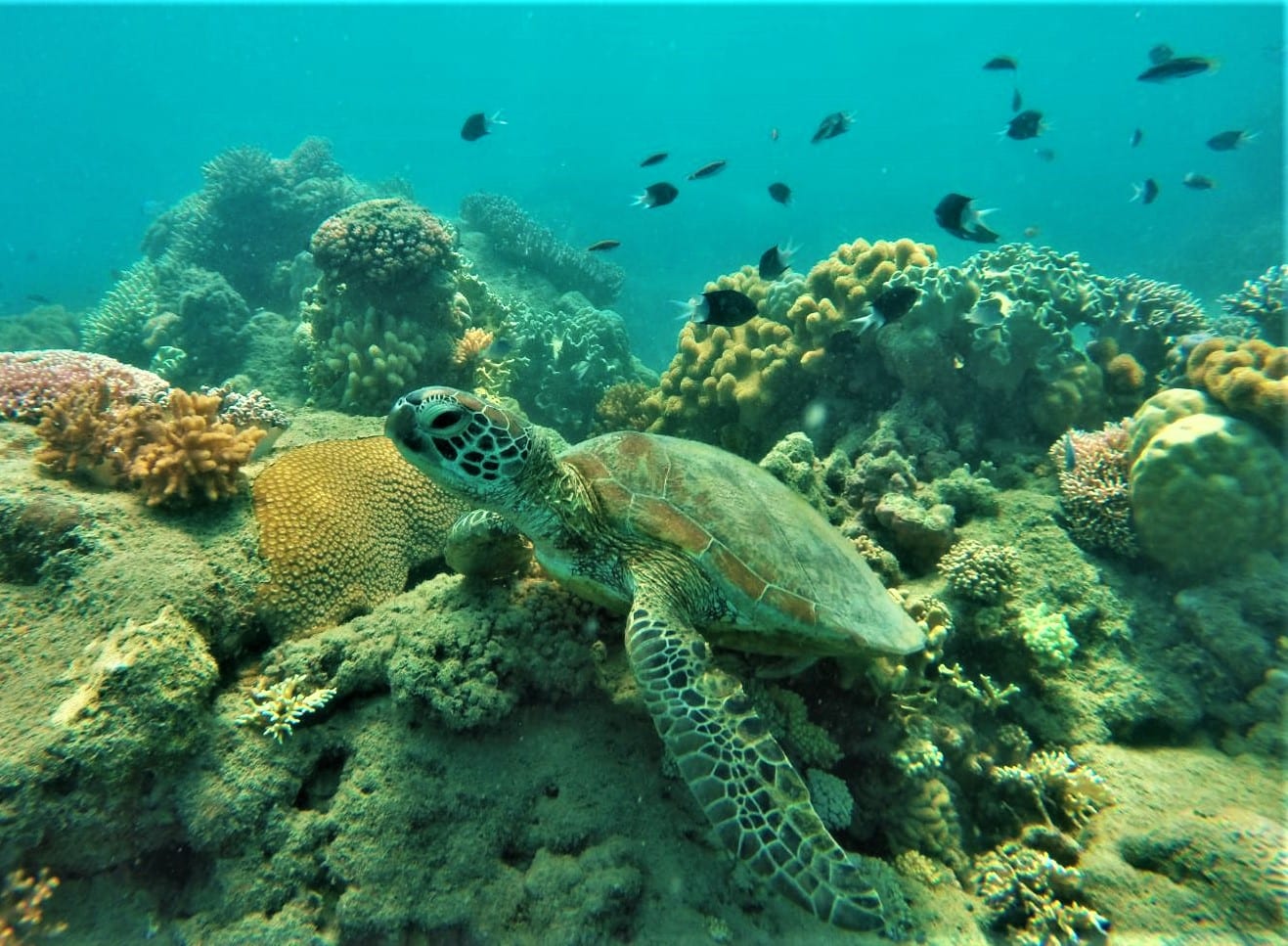
Turtle Nesting in Agnes Water and 1770
Every year from November through to March, our local beaches take on the role as nursery to 3 out of the 7 sea turtle species. Turtles as old as 100 years make their way from their feeding grounds to lay their eggs on the very same beach which they hatched upon.
The largest concentration of laying events will be happening throughout December and January. Unfortunately for these ancient reptiles, this coincides with the busiest holidays of the year. As humans are the number one threat to the sea turtles population, and as we enter into the ‘silly season’ we would really like to spread the word to help give these endangered turtles a fighting chance for their future.
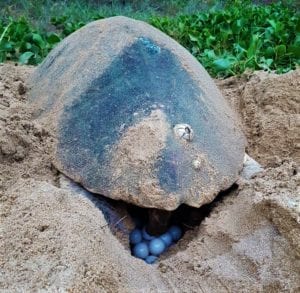
A Loggerhead female part way through laying at Mon Repo
How to help
Here are some examples of how we could be unknowingly harming the turtle population and solutions to prevent them from occurring:
The traditional campfire
– No camping trip is complete without a campfire, we can almost smell the melting marshmallows. However an illegal beach camp fire could be sitting right on top of a freshly laid turtle nest. This fire placement is more common than you might think, as the only evidence a nesting turtle will leave behind is a shallow bowl indentation in the sand. A very perfect looking spot to start a camp fire. Can you see the problem here? – Poached eggs.
Prevention – Firstly check the local fire bans, use fire pits designated by QPWS only, or toast your marshmallows on a gas stove instead.
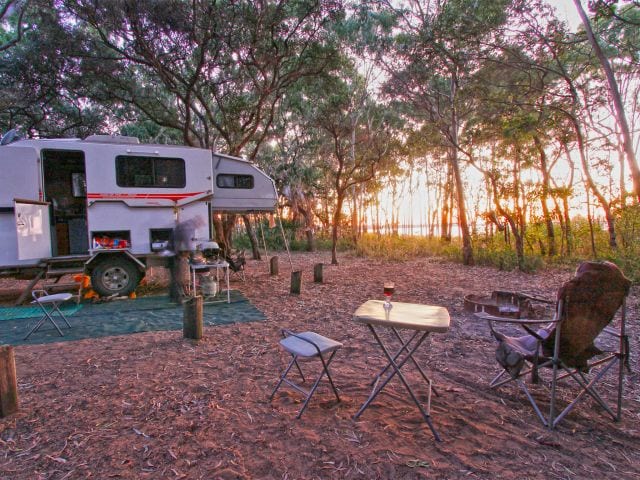
Spot the QPWS fire ring (mid-right hand side)
Beach umbrellas
– What do beach umbrellas have to do with it? When a nesting females digs her nest she creates a chamber in a shape like a light bulb, wide and round at the bottom with a small opening at the top. Once the eggs have been laid the female fills up the hole and packs it in tightly creating a seal to the chamber. From there not much can affect the nest. However if you unknowingly plant your beach umbrella into the sand piercing a nest, it instantly breaks the seal and opens it up to predation from crabs, lace monitor lizards, foxes and also makes the nest susceptible to moisture, bacteria and fungus damage.
Prevention – Set up your beach umbrella below the high water mark, use a beach pop up shade or relax under a tree.

We like the Cancer Council’s pop up cabana – available here
Canine Friends
– Taking the dog for a walk along the beach is the everyday norm for so many Australians, and is more than likely your dog’s favourite place to be (not to mention your own). However it doesn’t matter how big or small your dog may be, or if you dog has never dug a hole in its life, once any canine gets a whiff of the pheromones from a freshly laid nest they will stop at nothing to find the source, the result – scrambled eggs!
Prevention – Keep all dogs on leashes between November and March, take the dogs to the park instead, and ensure scruffy is secure at night time.

All dogs love smelly things
General rubbish
– Mating and nesting is hungry work! A nesting female can lay between 3 – 6 nests a season and to get to this point she must undergo a strenuous mating ritual. So naturally these visiting turtles will be on the constant lookout for tasty snack. One of their most favoured foods is mouth-watering jellyfish (basically turtle chocolate)! Unfortunately there’s a lot of litter that can appear as Jelly fish. Most common is floating plastic bags, plastic bottles, and also cigarette butts that expand in the water. The consumption of any of these, if untreated is certain death for the turtle.
Prevention – Dispose of your waste responsibly, pick up rubbish when you visit the beach, avoid purchasing single use plastics.
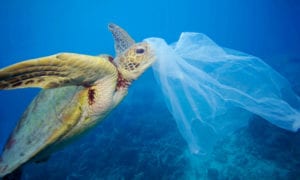
Reduce, Reuse, Repurpose and Recycle
Photo ops
– More and more people are becoming aware of our nesting season and sadly this has created a lot interference to this natural phenomenon. The social media hype has people wanting to capture unique videos, selfies, and images, sometimes with total disregard for the animal’s wellbeing. Interference like this can prevent a nesting female from laying, it’s possible that she will release her eggs into the water instead, stress can fatigue the animal and make it easier prey for sharks, or could stop the turtle from ever returning to our beaches.
Prevention – Educate visitors, visit Mon Repo for controlled encounters, report illegal beach camping and turtle interference (can incur $10,000 fine).
How to act
If you have seen a turtle coming ashore or have come across a female already nesting, do not approach the animal, stop still and get as low to the ground as possible. If you have a phone with you, call our local Turtle Sightings Hotline and report it (you will find this number on a sign at every entrance to our beaches). This will ensure this girl and her nest is recorded for future research and the nest will be mapped and guarded until hatched. Once that is done sit back and observe this once in a lifetime opportunity. Keep an eye on other people who may be walking the beach and advise them to follow suit.
Want to learn more?
Our very experienced and knowledgeable crew at 1770 LARC! Tours have aided in recording the movements, nesting and hatching of turtles since the beginning of our operation in 1994. Each of our 4 tour options provides the opportunity to spot these wonderful creatures and our team are always ready and eager to answer any questions you might have. Join us today!
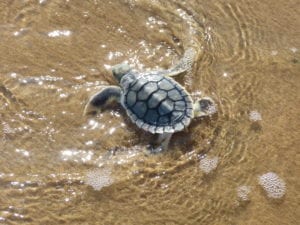
Turtle Hatchling in Agnes Water

Pingback:Planning your Agnes Water & 1770 Holiday
Posted at 12:15h, 08 December[…] beach restrictions before entering with dogs, all of the local beaches are nesting grounds for endangered turtles and […]
jean imbert
Posted at 09:30h, 18 NovemberIs there any volunteer work available
LARC team
Posted at 10:01h, 18 NovemberHi Jean,
You are best to contact the Discovery Coast Environmental Group as they recruit the research volunteers for the public beaches in Agnes. They have a AGM tonight and the Community Hall at 5pm.